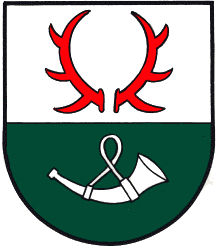Dobl: Difference between revisions
Jump to navigation
Jump to search
Knorrepoes (talk | contribs) m (Text replace - "Österreich" />" />" to "Österreich" />") |
Knorrepoes (talk | contribs) m (Text replace - "[[Literature" to "{{media}} [[Literature") |
||
| Line 16: | Line 16: | ||
Dobl is situated near the Kaiserwald, a forest that was the property of the Dukes of Styria from the 13<sup>th</sup> century on. The forest was used as a hunting preserve. At Dobl, there is Gjaidhof castle, which has its name from hunting ("Gjaid" is an old word, not common any more, meaning "the hunt"). The arms' charges illustrate that (a stag's antlers and a horn). | Dobl is situated near the Kaiserwald, a forest that was the property of the Dukes of Styria from the 13<sup>th</sup> century on. The forest was used as a hunting preserve. At Dobl, there is Gjaidhof castle, which has its name from hunting ("Gjaid" is an old word, not common any more, meaning "the hunt"). The arms' charges illustrate that (a stag's antlers and a horn). | ||
{{media}} | |||
[[Literature]] : Image provided by Karl Palfrader (k.palfrader@aon.at), MStLA 16 (1966), p. 53 | [[Literature]] : Image provided by Karl Palfrader (k.palfrader@aon.at), MStLA 16 (1966), p. 53 | ||
Revision as of 20:42, 8 July 2014
| Heraldry of the World Civic heraldry of Austria - Österreichische Gemeindewappen |
DOBL
State : Steiermark
District : Graz-Umgebung
Origin/meaning
The arms were granted on November 23, 1962.
Dobl is situated near the Kaiserwald, a forest that was the property of the Dukes of Styria from the 13th century on. The forest was used as a hunting preserve. At Dobl, there is Gjaidhof castle, which has its name from hunting ("Gjaid" is an old word, not common any more, meaning "the hunt"). The arms' charges illustrate that (a stag's antlers and a horn).
Contact and Support
Partners:
Your logo here ?
Contact us
© since 1995, Heraldry of the World, Ralf Hartemink 
Index of the site
Literature : Image provided by Karl Palfrader (k.palfrader@aon.at), MStLA 16 (1966), p. 53











